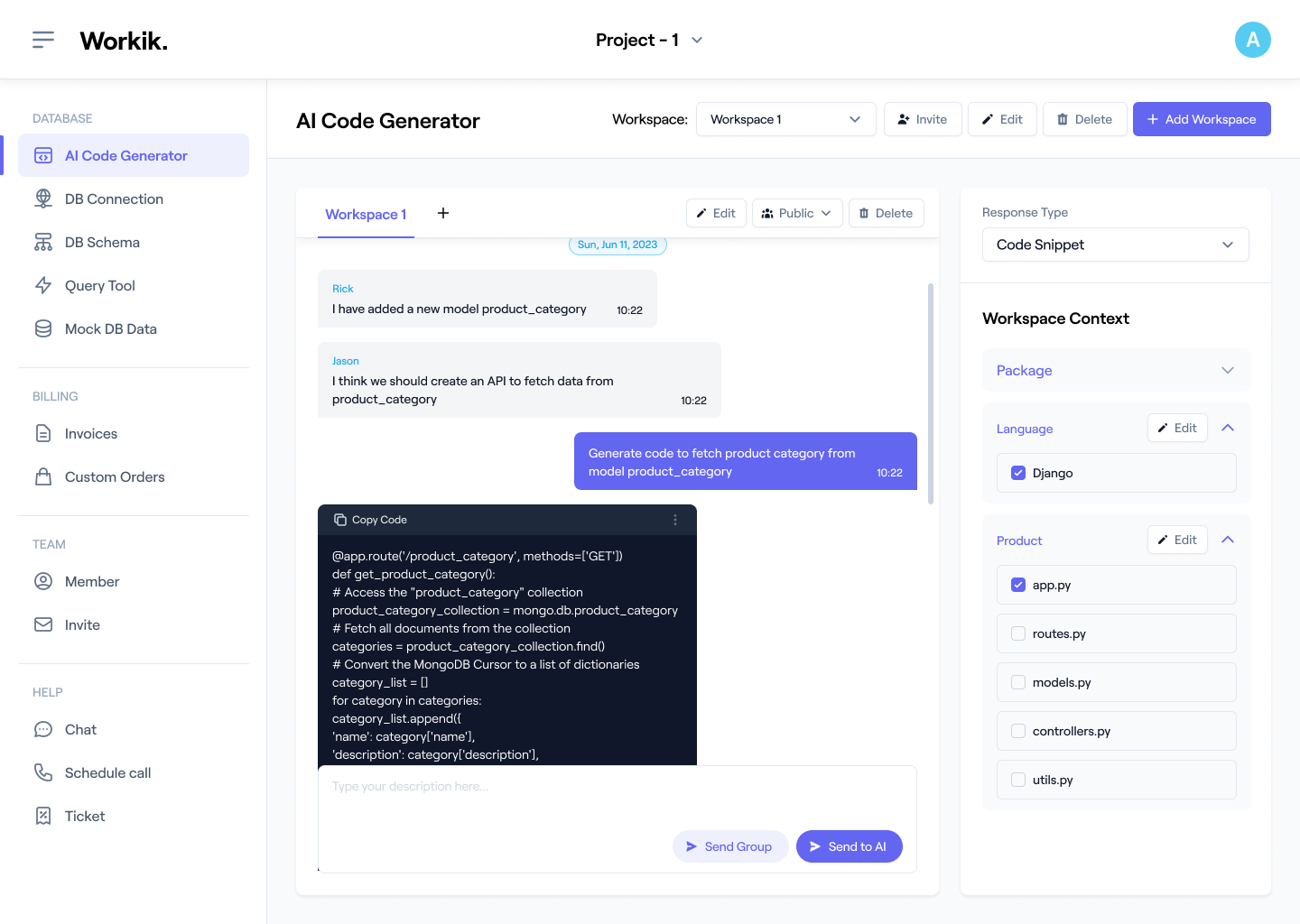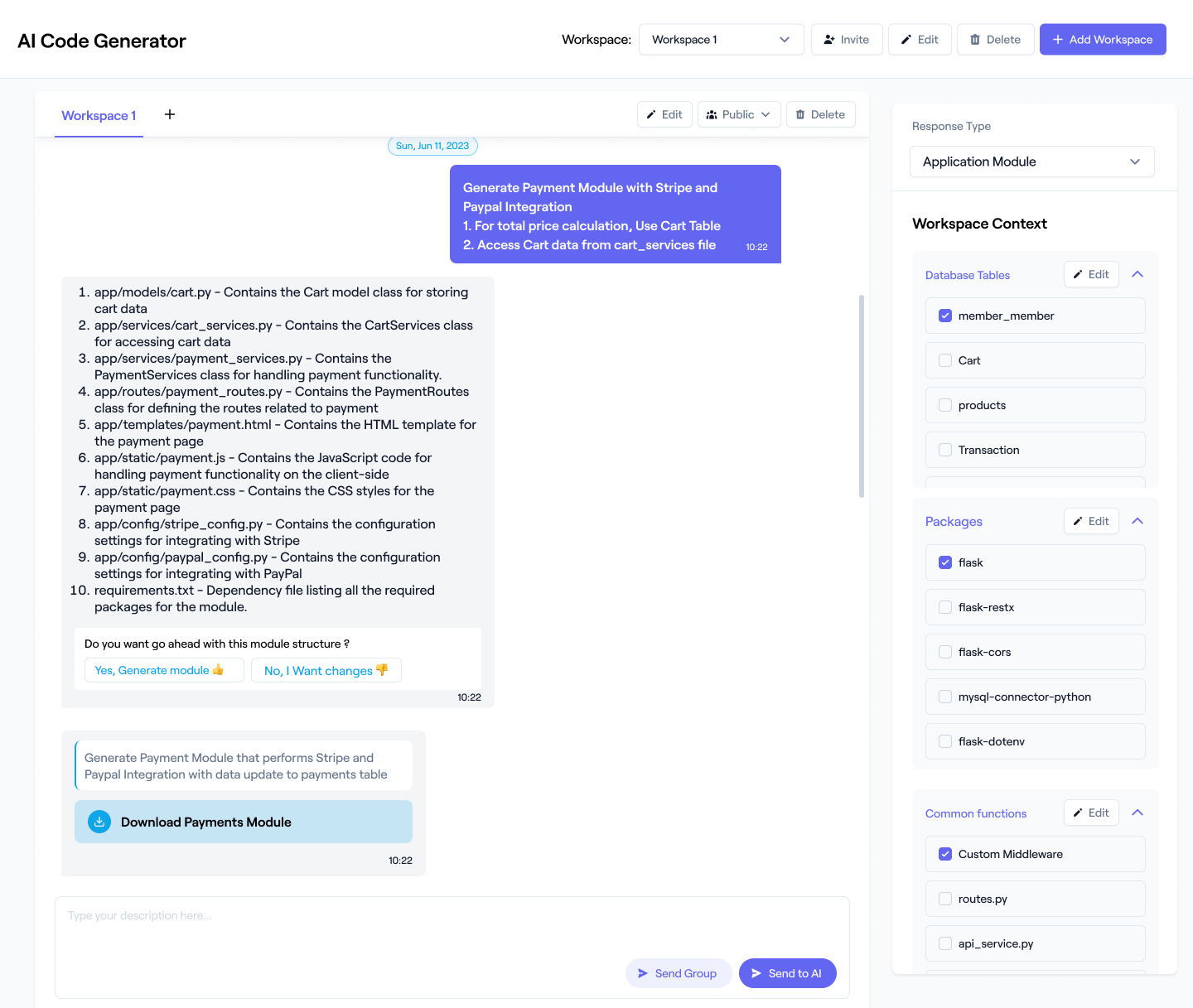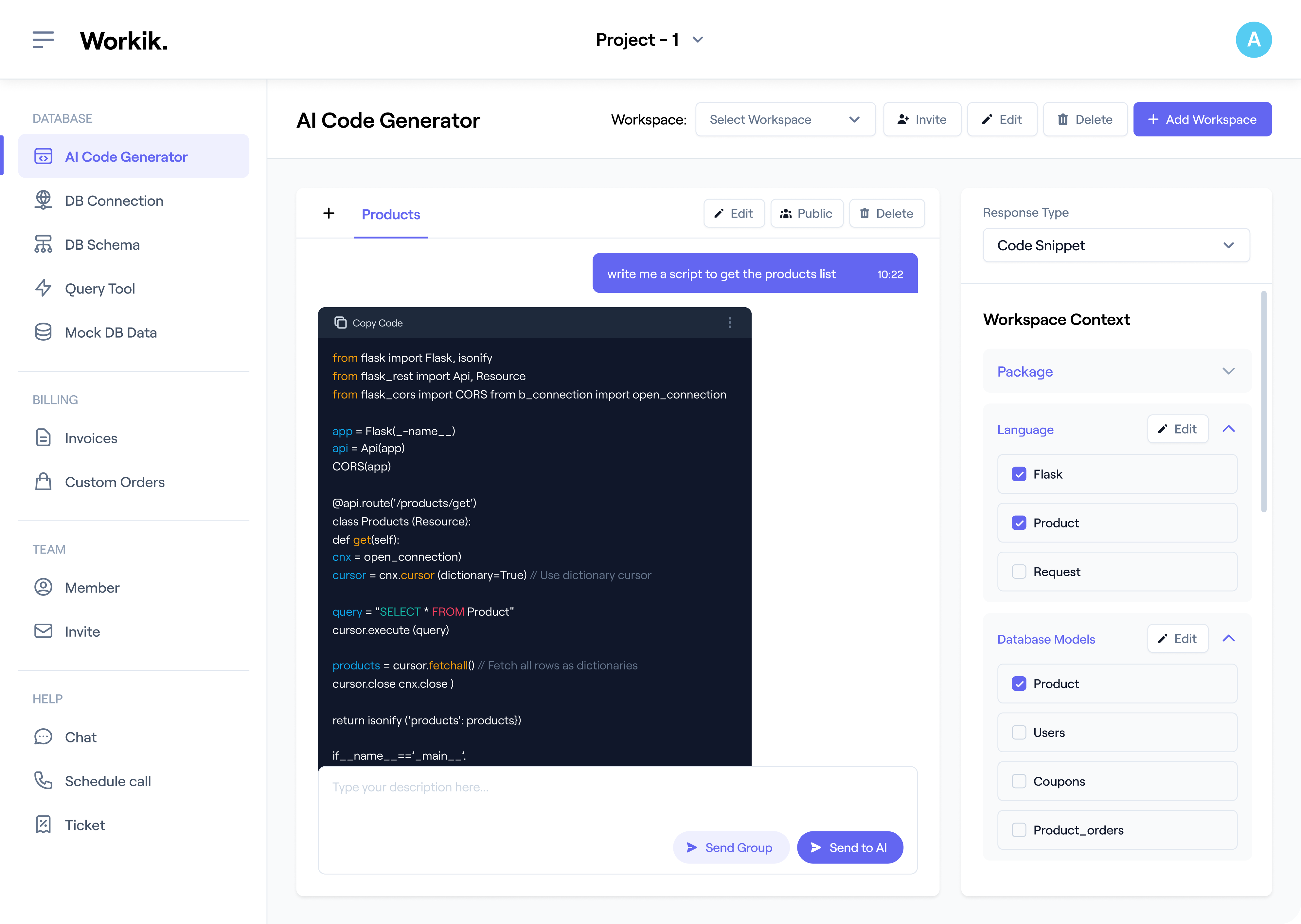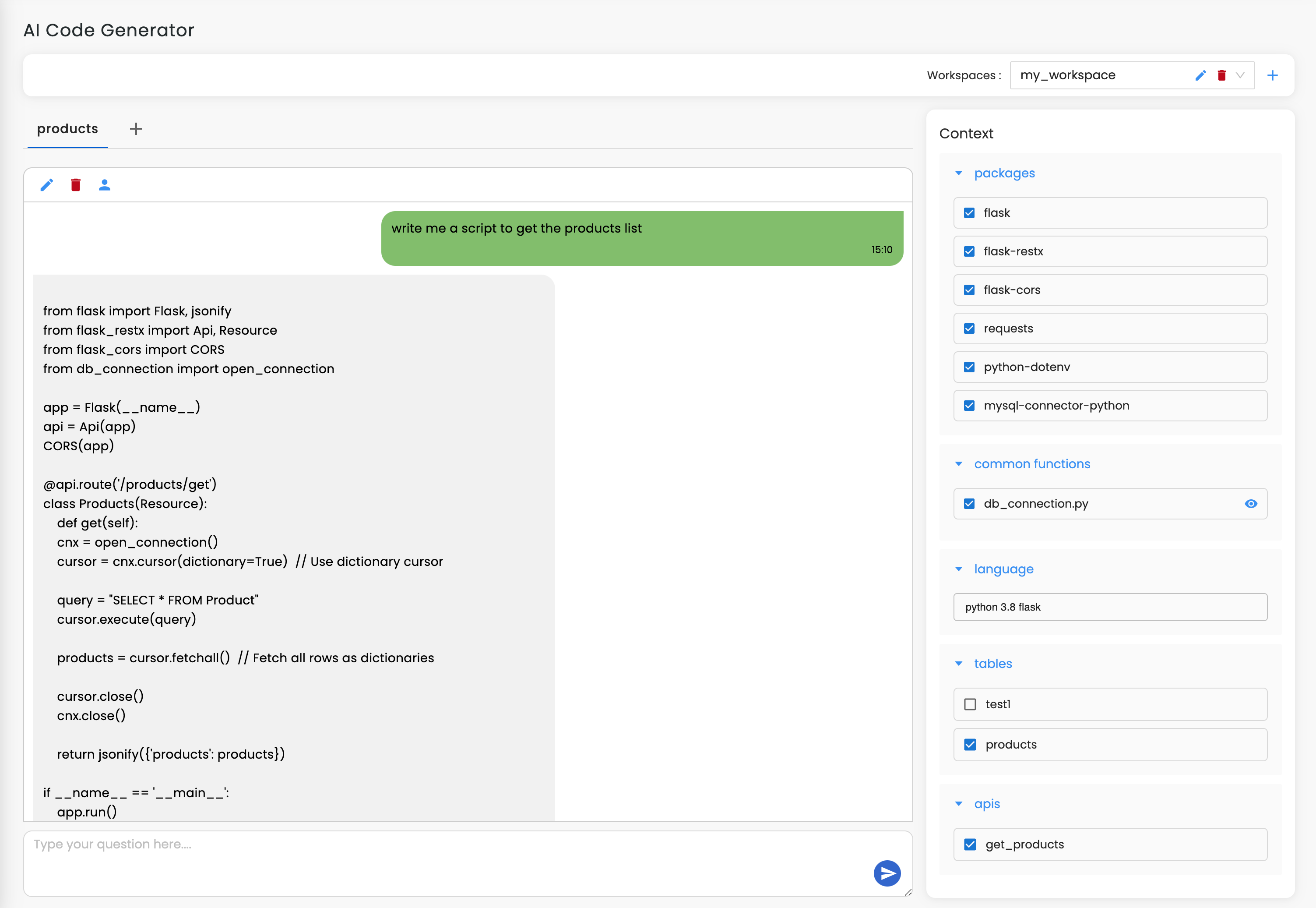
Join our community to see how developers are using Workik AI everyday.
Features

Validate Syntax Across Languages
AI validates syntax for JavaScript, Python & more, integrating with ESLint and Pylint to ensure language-specific accuracy.

Detect Errors Instantly
AI flags syntax issues in VS Code and JetBrains, offering suggestions based on coding best practices for seamless debugging.

Automate Checks in CI/CD
Integrate AI with Jenkins, Travis CI & more, automating syntax checks during commits and pull requests to maintain code quality.

Enforce Coding Standards
Set and enforce custom linter rules with ESLint and RuboCop, using AI to ensure consistent coding practices across your team.
How it works
Create a free Workik account or sign up with Google to access the AI-powered Code Syntax Validator.
Sync your codebase from GitHub, GitLab, or Bitbucket. Specify your coding language (JavaScript, Python, PHP) and set up linters like ESLint or Pylint for context-aware syntax validation.
Let AI scan for syntax errors, highlight issues, and suggest fixes using industry-standard tools.
Invite your team to collaborate on syntax reviews. Use AI feedback to refine the code further, ensuring compliance with coding standards and error-free execution.


Expand


Expand


Expand


Expand


Expand


Expand


Expand


TESTIMONIALS
Real Stories, Real Results with Workik
Workik’s AI caught syntax errors instantly, cutting my debugging time in half. Essential for JavaScript validation!

Marta Armstrong
Frontend Developer
AI suggestions are precise and actionable, speeding up code reviews and reducing errors.

Abigail Miles
Full-Stack Developer
As a junior, it gives me instant feedback on syntax errors, helping me code better and faster.

Evan Duncan
Junior Developer
What are some popular use cases of Workik’s AI-powered Code Syntax Validator?


Workik’s AI-powered Code Syntax Validator is ideal for use cases such as:
* Detecting syntax errors in JavaScript, Python, PHP & more.
* Enforcing coding standards via ESLint, Pylint, or RuboCop.
* Automating syntax checks in CI/CD pipelines with Jenkins or GitHub Actions.
* Providing instant feedback in IDEs like VS Code and JetBrains to correct errors as you code.
* Validating multi-language codebases for consistent syntax and fewer errors.
What context-setting options are available in Workik’s AI for Code Syntax Validator?


Workik offers context-setting options for Code Syntax Validator such as:
* Syncing codebases from GitHub, GitLab, or Bitbucket for ongoing validation.
* Specify languages and frameworks like React, Django, or Laravel for accurate checks.
* Configure linters like ESLint or Pylint for project-specific syntax rules.
* Add API blueprints and database schemas for context-aware validation.
* Integrate with IDEs for in-editor syntax validation and fixes.
* Set custom linting rules to maintain consistent coding standards.
Can Workik AI help identify and fix cross-language compatibility issues in syntax?


Yes, Workik AI can detect syntax conflicts in projects with multiple languages (e.g., JavaScript for frontend and Python for backend). It ensures consistent syntax and highlights areas where integrations may cause issues, such as mismatched API calls or unsupported types.
Does Workik AI provide recommendations for deprecated syntax or features?


Absolutely! Workik AI flags deprecated syntax or outdated features, suggesting modern alternatives. This ensures your code adheres to the latest standards, especially in languages like Python, JavaScript, and PHP.
Can Workik AI validate syntax for frameworks and libraries beyond core languages?


Yes, Workik AI extends syntax validation to frameworks like React, Django, Laravel, and more. It understands framework-specific syntax and ensures your code integrates seamlessly with libraries such as Axios, NumPy, or Sequelize.
Generate Code For Free

Code Syntax: Question & Answer
Developers use code syntax validation tools to catch errors early, maintain consistency, and streamline debugging in languages like JavaScript, Python, and PHP. These tools enforce coding standards, automate checks in CI/CD pipelines, and reduce manual code reviews, ensuring cleaner code before production.
Popular tools used in code syntax validation include:
Languages:
JavaScript, Python, PHP, Ruby, TypeScript, Go, Swift, Java, C#, Kotlin
Validation Tools:
ESLint, Pylint, PHP CodeSniffer, RuboCop
Framework Support:
React, Django, Laravel, Ruby on Rails
Testing Tools:
Jest, PyTest, PHPUnit
CI/CD Integration:
Jenkins, Travis CI, GitHub Actions
IDE Support:
VS Code, JetBrains
Popular use cases of code syntax validation include but are not limited to:
Error Prevention:
Automatically fix syntax errors in JavaScript, Python, and PHP before execution.
Standards Enforcement:
Using ESLint, Pylint to ensure adherence to coding rules.
CI/CD Integration:
Automating syntax checks during commits and pull requests.
Cross-Language Support:
Ensure consistent code style and standards across JavaScript, Python, PHP, and more.
Code Review Assistance:
Offering syntax corrections in editors like VS Code and JetBrains.
Professionals skilled in code syntax validation can pursue roles such as Frontend Developer, Backend Developer, Full Stack Developer, DevOps Engineer, QA Engineer, and Technical Lead.
Workik AI enhances code syntax validation by:
Error Detection:
Instantly flags syntax errors in JavaScript, Python, PHP, and more.
Standards Enforcement:
Works with ESLint and Pylint to apply custom linting rules.
CI/CD Automation:
Validates syntax during commits with Jenkins and GitHub Actions.
IDE Integration:
Suggests syntax fixes within editors like VS Code and JetBrains.
Multi-Language Support:
Ensures consistent syntax across frontend and backend code.
Security Enhancements:
Detects syntax errors that may lead to vulnerabilities.
4.74 out of 5, based on 1479 reviews
Explore more on Workik
Get in touch
Don't miss any updates of our product.
© Workik Inc. 2026 All rights reserved.

